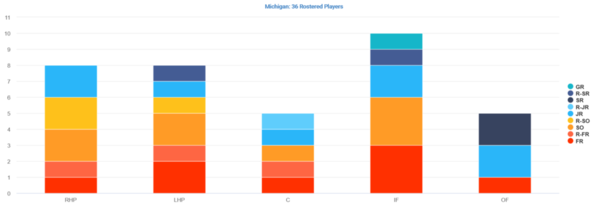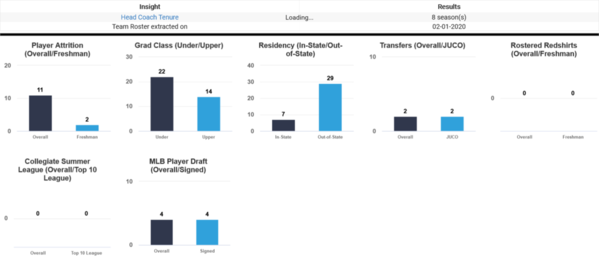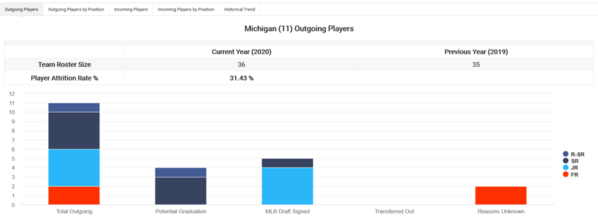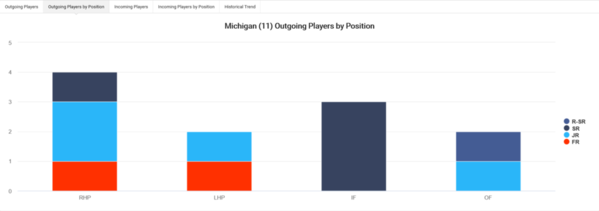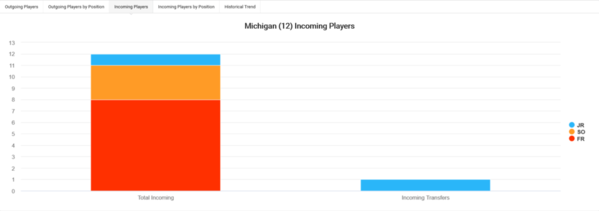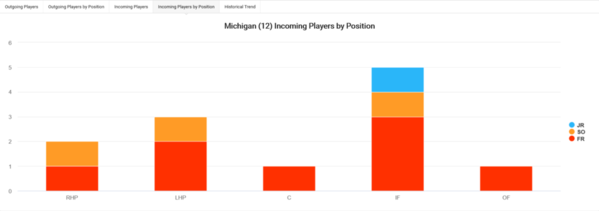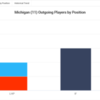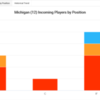Offers are starting to come in for son. He’s not ready to commit, but I do think that we should start researching pitching coaches. We know that we should find a school that he’d like regardless of baseball. He currently has no idea on what he wants to major (older son didn’t decide until sophomore in college). So with that just want to look into the programs with the highest quality pitching programs to start narrowing the field I’d love to hear everyone’s thoughts on which coaches are known to take care of their pitchers & get them to the next level and more importantly which coaches are known for not taking care of their pitchers resulting in lots of injuries. Son currently follows Driveline so programs that follow their methods would be a plus.
Replies sorted oldest to newest
Butch Thompson at Auburn is really good with pitchers. Recruited my son at Miss State but son went to Clemson.
Andrew See at Clemson worked well with my son over the 3 years he was there.
That's going to be a tough one for you, but if you and your son are willing to do the research, there will be some indicators out there just on the team roster and stats pages. For schools he might be interested in, take a three year look at the roster and the archived stats pages. My son did this for his top schools and it was really telling in terms of who pitched each year, how much they pitched, and what did they do the next year. It can be a lot of work and tedious, but it is well worth the time and effort.
Seeing a lot of roster churn is telling for pitchers, as many schools start slow at freshman year, maybe even redshirt several pitchers, and then build up pitchers with juniors and seniors getting the most innings. Top freshman may start, but most likely work in the bullpen. Are there JuCos and other transfers who come in and immediately get the innings? You can even get some indication of injuries for kids who pitch a lot and then stop pitching. But are kids who began as freshman at the school building up to become mainstays over time, or are they just dropped and transfer?
Not sure how elite your son is, but clearly UCLA and Vanderbilt are two of the best at recruiting and developing pitchers who become MLB stars (G.Cole, Griffin Canning, Price, Buehler and so on). There are plenty of highly regarded pitching coaches on other schools, and some of them are pretty stable in their programs. Finally, you can always ask the guys at Driveline who they communicate a lot with--works both ways as they can get a word in with the coaches/schools they know.
Good luck.
I understand the concept of getting to a PROGRAM that takes good care of its pitchers, but I wouldn't get too attached to any specific individual at college.
The pitching coach who recruited my son went to the pros before his freshman season started, the guy they brought in to replace him who had 12 years in the majors isn't coming back for a second year and the new one used to be the hitting coach and apparently was a strength coach before that. Son has learned a lot from each of them and formed new relationships that will serve him well in the future.
In all of their favor, they pulled son out of summer ball commitment at the last minute and arranged for him to spend the summer working with an outside coach on some mechanical issue that they all agreed needed to be addressed before his sophomore year. Neither my son, nor my husband or I had any idea the issue existed, but when I showed a photo of him throwing to one of our trusted baseball coach friends he immediately said "gosh yes, totally the right thing to do."
Backstop22 posted:….…………………………………...
Seeing a lot of roster churn is telling for pitchers, as many schools start slow at freshman year, maybe even redshirt several pitchers, and then build up pitchers with juniors and seniors getting the most innings. Top freshman may start, but most likely work in the bullpen. Are there JuCos and other transfers who come in and immediately get the innings? You can even get some indication of injuries for kids who pitch a lot and then stop pitching. But are kids who began as freshman at the school building up to become mainstays over time, or are they just dropped and transfer?
….…………………………………….
Bingo. Yahtzee. Good call Backstop22.. We took this historical approach in our research, and found one offering program in particular had challenges keeping their pitchers healthy over a 4-5 year period. Coaches will always tell you what you want to hear when they are recruiting somebody. Look into their history and also their in-season and out of season training practices and philosophies. Look into the pitching staffs performance as it relates to peer schools or schools in the same conference. Results matter when choosing between similar schools and pitching philosophy. We had one recruiting PC that was all about endurance and running distances. This made no sense to us. Yes running is important for conditioning but running a 10K isn't getting hitters out.
Never underestimate chemistry. My son knew from the minute he met his PC that this was the guy he wanted to work with every day for 4 years. This guy was data driven, logical, and common sense was a major part of his coaching. This is vastly better coaching style than the "yeller" or the "fly off the handle coach" that my son saw when he visited some other schools. My son's PC let each pitcher work within their unique style and the pitching coach adapted to them rather than the cookie cutter approach that you see many college coaches implement where the pitcher has to adjust to that one style.
There is a lot to consider. Good luck.
There are plenty of good pitching coaches out there. I think you would be better served asking around about specific schools he is interested in. Me recommending a coach at Northwest Southeast University doesn't mean much if that isn't a school he'd consider. You'd probably be better off asking - who are the best PCs in the SEC, ACC, Patriot, Ivy, etc.
As it was mentioned, a coach should help make a decision, but don't get attached. Their jobs are only as good as the staff ERA or as good as the HC makes them. When the HC takes a new job or gets fired, usually everybody goes.
Also injuries happen. I know it is good to be on the cautious side and if there is a history of injuries that is concerning but if coaches have a program in place and players slack off or don't take care of their bodies you can't pin that on the coach. I knew a player who was having arm problems in school and wasn't pitching. I saw the coach at an event and asked what was going on. He wasn't following his program. The coach told me exactly how he would injure himself and sure enough it happened later that summer and he'd be out of baseball by the following spring.
Would have to throw Frank Anderson at the University of Tennessee. Great developer of pitchers and getting them to the show, including his own son. New to UT so he will probably be there for a while and just got a raise. Don't think he wants back into the HC thing.
In my neck of the woods the TCU pitching coach has a good reputation, OU head coach, LSU head coach, Arkansas pitching coach, Texas A&M head coach, Texas Tech pitching coach are some that come to mind along with others... would list the names, but would have to look up the spellings on many of these...
Every kids situation is different. The best pitching coach might not be the best fit for your son. How many innings are guys getting outside of the 3 weekend starters, mid week starter and top guys out of the pen? Are 8 guys throwing all the innings? How do guys develop in the program? Are all the top inning guys Fresh and Sophs? Are there any Jr's and Sr's getting significant innings? In this program with the best pitching coach is that the best situation for your son? Is there that much difference in with THIS best pitching coach is doing and the better fit for your son with that pitching coach?
Now if your son is a top level arm who is going to be a dude no matter where he goes then fine by all means find the guy you believe is that guy. Of course there's no guarantee he will be there once he get's there are after he get's there.
I say find the best fit for your son period. That includes a solid PC HC AC etc. The best pitching coach I know coaches at a D2. If your son is a high level D1 guy would you send him to the D2 because he is the best pitching coach in America? And to be honest the top programs have the top arms. Philosophy, Development, Interaction, Personality, Consistency, Prior Success, etc etc.
Good Luck
My 2020 is not going to a P5 or mid major, but outside of researching the schools, when he's speaking with the coach/HC he asked about their pitcher training, etc. There are certain things that would be red flags for him.
We've also been targeting schools where the HC is either an ex pitcher or catcher.
2020-RHP-Dad posted:In my neck of the woods the TCU pitching coach has a good reputation, OU head coach, LSU head coach, Arkansas pitching coach, Texas A&M head coach, Texas Tech pitching coach are some that come to mind along with others... would list the names, but would have to look up the spellings on many of these...
Things are not always as they appear to be......or how they are described by the clueless broadcasters on ESPN telecasts (with apologies to Kyle Peterson - who is actually very good).
adbono posted:Things are not always as they appear to be......or how they are described by the clueless broadcasters
I freely admit to not being able to personally evaluate who is or who is not an elite college pitching coach. What I wrote are names that I have been told were or have heard or read somewhere that they were pretty good... so take it for whatever that's worth. The only decent metric I can use personally is pitching success their players have in college games and beyond - and even that is not necessarily a good metric as the top programs start with much better pitching talent to begin with.
Since your son follows Driveline, he may have seen this tweet about tech in college baseball.
As MidAtlanticDad (MAD [really?]), pointed out, all programs are going high(er) tech.
As in all new technology applications, there is a huge learning curve. Therefore, while the biggest programs have virtually the same tech as proball (e.g., Rapsodo), imo, most coaches are not (yet) to the stage where they actually understand (a) what the numbers mean, (b) how to identify the key variables (i.e., out of all the data generated, which are important), and/or (c) how to adjust/teach the delivery to get the desired metrics.
In fact, the pros are still analyzing which variables are critical. As proball refines and focuses on one data point over another, players have adapted deliveries to hit those metrics. I believe last year a guy was signed and released by half a dozen teams after he posted eye popping metrics, only to not be able to get guys actually out. So, there's that problem.
At the college level, the problem of understanding what to do with the data is magnified as each program goes to seminars, listens to industry consultants for suggestions, etc., on how to incorporate this huge influx of data into their programs. Much of what a program may focus on today (and insist their players conform to) will be found to be fairy dust tomorrow as a new data point is "discovered."
(From a practical standpoint, at the granular level, is the impact/reliance the tech has on, for example, a bull pen. Before spring training began, I watched a whole series of pro guys use the system for their lessons. Instead of a flowing series of pitches synced to a pitcher's rhythm, after every pitch was THE PAUSE (lasting half a minute and more), waiting for the data to be displayed, reading and reacting to the data, discussing how to improve the key numbers (without changing good numbers), then mentally adjusting and, finally, throwing. Then rinse and repeat. An entirely different approach to a BP and one which takes time to adjust too.)
Most college coaches I know may well figure it out in the long run, but are using their current players as Guinea pigs in changing swings and deliveries.
(Of course, the player has no choice but to make the changes the coach orders.)
Luckily son is only a 2022, so hopefully the coaches will have the tech a little more figured out. We have a Rapsodo & caught ourselves doing the same thing you described, so other than checking spin efficiency every once in a while, we’ve put it up until the off season.
@KLL - wondering what you have learned in the last 18 months with how to approach the process of identifying high quality college pitching programs. My son is a 2024 LHP, we are two years behind you on this journey.
How much of a data-driven approach did you take?
How many schools did you help your son do research on, or unofficially visit before you started to narrow the choices?
thanks in advance for updating this story.
A poor S&C coach can make a good PC look worse than he actually is. Also, a PC can only work with the guys who make it to campus. Outside factors, like ugly uniforms, ballpark fence distance, wrong swag partner, etc can drive or eliminate talent coming in the door. There is a lot of gray area that you could consider and drive yourself mad. Usually you will just know it when the fit is right. Go where you are loved. A PC that checks all the boxes but could care less about your player being there is not a good fit.
@mjd-dad posted:@KLL - wondering what you have learned in the last 18 months with how to approach the process of identifying high quality college pitching programs. My son is a 2024 LHP, we are two years behind you on this journey.
How much of a data-driven approach did you take?
How many schools did you help your son do research on, or unofficially visit before you started to narrow the choices?
thanks in advance for updating this story.
Wondering that myself as the original post was a while ago.
Of course Scott Brown at Vandy. Danny Borrell at GT is the GOAT and like fenway mentioned for her son, my son bonded immediately with DBo and the rest of the GT coaches (Easy choice). Dusty Blake at Duke was good. UVA was good. UNC was good. Hobbs at Arkansas was good. Wake is good, wonderful facility. Most at the elite level are going to be good. Again it is going to be more about fit. ATOC Podcast, I was impressed by what Iowa had to say and what they have and are working with and their approach there.
You want to go somewhere, as others have said, where they want you, work with you and aren't known for playing favorites. Is your visit more about them bragging on the program or about how and what they do to develop, work with and get their players to the next level. You want to go somewhere that works with and develops their pitchers and doesn't overhaul, just tweaks. You got to that level for a reason so minor tweaks will elevate more than overhaul.
Some schools only recruit GAS (throwers) others recruit CONTROL (Pitchers). Look to see what kind of program they are. As others have said, RESEARCH!! How many Pitchers per class? What is longevity at programs, year over year....look at injuries. @CollegebaseballInsights might have some metrics on this. When would you get a chance to play? So many in front of you you won't pitch until SO or JR? or Do you have a chance to compete and play as a FR? There are programs that are known for not playing freshman.
My son "short arms" and everyone commented on it and held it against him BUT the elite programs, like Duke, GT, UVA and others that actually recruit for and/or work with that style ("more control, less injuries, faster recovery"). Once he broke 90 and with control pitched a perfect game at WWBA playing up his Junior year, the others flipped the script, which was a put off. Gas and Control is a great asset.
Look at the various programs and cities they're in. That was a HUGE knock against Duke. Durham (just like Austin) (is not a city I would recommend). I know this as I lived there for 3 years working at the Medical Center and it only got worse when we went for a camp at UNC/Duke and toured both cities almost 20 years later. I currently live in Austin for the past 20 years.......
You should also like the city you're in and the campus you're on. That is why it is so important to get eyes on campus and visit!
Some really good points made by Coach May and adbono.
I might add that some folks are rattling off names of PC's from programs that most sons of parents here will never get a chance to meet or set foot on their campus.
This is no offense to anyone, but just a bit of reality. If you have an elite player, go for it, if not, dont waste your time trying to contact these P5 programs, be realistic.
There are a lot of really, really accomplished pitching coaches in mid D1 programs which probably would be a very good match for most. I cannot comment on D2 or D3, or JUCO.
I do know two things, coaches recruit players and decide who comes and who stays, not the other way around. Keep that in mind when that elite HC does not offer, dont take it personally.
Also, keep in mind that most coaches are not the same guy who you thought he was when he recruited you a few years ago.
They might not even be there anymore.
@Eokerholm posted:Look at the various programs and cities they're in. That was a HUGE knock against Duke. Durham is a DUMP. I know this as I lived there for 3 years working at the Medical Center and it only got worse when we went for a camp at UNC/Duke and toured both cities almost 20 years later.
Interesting that you say that. My son was also recruited by Duke. We love the Duke campus and the neighborhoods around it. But I do agree once you get into the commerce areas it does definitely change. If my son would have chosen Duke we were thinking about relocating to the Carey area. We love the area around the USA Baseball complex.
Cary is super nice. So is Chapel Hill and everything is close in the area anyway. I would not live in or near Durham. Cary is even closer for those day trips to Wilmington Beach. Miss those.
Yeskie is the best in the country, imo. While Oregon St recruited well on the top end, he developed a lot of bullpen guys from mid 80's to low-mid 90's. If you aren't a top end guy, I'd look at DBU, Charlotte, South Alabama, Southern Miss but understand a couple of those go heavy on JUCO transfers.
For what it's worth in regards to Texas A&M (mentioned above), the PC is the Head Coach, Rob Childress. My son pitched there for Coach Childress. I would let his resume speak for itself in regards to team pitching statistics and getting guys drafted, both in terms of numbers and where they place in the draft - year after year.
How did this thread go from D1 pitching coaches to comments about particular cities and locations? Seriously. I'm calling BS.
You folks are splitting hairs. Whats next...how many Starbucks are on campus? I've been to every SEC, ACC, Big 10 school for work...every single one. There are MANY that are very overrated including some mentioned above.
Bottom line...if you get a serious baseball opportunity at one of these schools look at their academics, facilities, pitching philosophies and all the other tips offered in the thread. Put the campus landscaping and the urban planning on the back burner.
JMO.
Butch Thompson is a guru although HC at Auburn but developed pitchers at MSU. He recruited some flamethrowers and also plenty of funky deliveries who could get outs. We were impressed by him on a visit to Starkvegas. I recall he had an exercise of pitching under the string. He said he worked with all types of pitchers, sizes and mechanics teaching his fundamentals to get outs.
See at Clemson was very good for my son. Almost the entire staff changed before fall practice his fresh. year. TPM's son also helped him his fresh year. Always nice to have an alum with Super & CWS experience and 8 years in the Milb coaching you.
I'm not sure how much "development" goes on at the TOP 25 D1 schools. I'm sure some more than others. It is a win, now league and some kids fall by the wayside along the way. If you have the staff and/or can get outs and throw strikes (all easy huh) you will play and contribute. Many of the pitchers ran out of gas during the season, maybe that was a byproduct of not using all the available staff. Looking back, i would have to say the 6th tool was where my son grew the most while in college.
Would love to hear about OG son's progress as well.
I uncall BS. ![]() You yourself mentioned it is more about "fit", like you said, you also need to take into consideration, coach personality, campus, city, etc.
You yourself mentioned it is more about "fit", like you said, you also need to take into consideration, coach personality, campus, city, etc.
It's not just about getting into a program with a Great PC, that you may not meld, gel with, in a city or campus you might not like.....
Eokerholm,
Yes, I did say that but it was not the focus of the message...the focus was evaluating D1 pitching coaches developmental styles. I did NOT call out a specific city as a "DUMP" and call out a very respected Texas A&M program or coach as "bipolar". You crossed a line in those comments. Don't you see that as a little offensive to post publicly? C'mon, you know better than that.
If you want to share a negative recruiting experience, situation or conversation from any school/coach then do it privately. Lord knows (over the years) I've shared plenty of bad and ugly experiences in many private messages.
As is often the case, there is merit to both sides of this discussion.......Once the recruiting process begins players, (and sometimes parents), ocassionally see the curtain pulled back to expose The Wizard. When this happens it’s impossible to “unsee” what has been seen. Sometimes that is good information to share, and sometimes it isn’t, but I would advise being careful about sharing it publicly.
I owned a house and lived in Durham for 3 years (1998-2000) and worked at Duke University Medical Center. I think I more than earned the right to provide my feedback to the area and campus, that I lived and worked on for 3 years. It had only gotten worse from when I moved in 2001 so yeah, if the area degraded to a bad area. I'm able to 100% make that call. We went back to my neighborhood to show my son my old house. It's not crack alley or anything, but it did waiver quite a bit from how it was and Durham, the city itself, DEFINITELY degraded. Fact. Chapel Hill, a place I had gone to many a time, only had gotten better. Again, my own personal hands-on/eyes-on experience. My son liked Duke but not Durham. Fact. Loved Chapel Hill and UNC. Fact.
The Duke campus is gorgeous. Golf course and trees amazing. Coaches, great. Ball field, and facilities, meh. It was honest feedback based on solely my experience and our personal interactions in 2019. Nothing to apologize for. This wasn't for a 3 hour experience or weekend visit. I spent a week there for 2 camps after living there for 3 years.
Same with Austin, I've lived here for 20+ years and I wouldn't move downtown if you paid me. I wouldn't send my kid to Austin either. Even though I'd have and be able to make home games. Austin is not the Austin you've all heard of or visited even 5 years ago and I challenge ANYONE to prove me different.
(I've updated above since it rubbed people the wrong way)
The "bipolar" thing was taken out of context and people need to chill. It was "tongue in cheek" in regards to people flip flopping on short arming vs straight velo, was all. Sorry if I offended any Aggies in the process. Just talking about how tons of coaches (not just UT or A&M) we're negative on arm action until 90+ and then they flipped their support, interest, or lack thereof. Certain programs, didn't name all the names, tried to come back to my son after breaking 90+ and just like we always say. You don't get another chance to make a first impression. He politely told them or shared with local coaches he was no longer interested in those programs and I was extremely proud of him. Again, personal experience and people being myopic in their perceptions, vs other programs that could see and work with the whole package and would rather "tweak" than "overhaul" and not be distracted by a different delivery or motion. 90 is not some magic number or glass ceiling or floor or whatever. There are still talented guys, above and below, at programs, at all levels, across the country effectively striking out batters and getting outs.
Again, I live in Austin and see and hear things (from MULTIPLE sources in the baseball world) about both UT and A&M, things I would want to know if I didn't.
@fenwaysouth Maybe your experience was different than ours and the various programs loved your son the whole time. Good for you. That wasn't the case for us with multiple programs. Feedback from places we visited and reasons why he would not want to attend various schools or was put off by them, staff, cities, campuses, etc.
Your experience is yours. My experience is mine and my son's experience is different than your son's. Would be different if I was making $hit up and didn't live somewhere or currently live somewhere I'm speaking to or about.
Definitely experience I would want to hear from someone who actually had been someplace if I was considering various programs across the country with no experience or insight into them.
Isn't this the place for that?
Again, apologize if I offended an Aggie or anyone, I wasn't making fun of the mentally ill and was an unsuccessful joking comment or analogy I can see how that would be perceived as over the line but this wasn't the first time and won't be the last where I overshare or I say too much.
A lot of players choose where to go based on many factors. Coaching staff, facilities, location, alumni family members, even football programs, etc. And as adbono suggests, once you get into exposing the cons, you need to be careful.
I do agree with Fenway, any negative information can and should be passed on thru private pm.
It's just not a good look.
JMO
FWIW, you all left out best D1 pitching coach, at UF, Kevin O'Sullivan, aka Sully.
There has been some good information provided by TPM, ShoveIt, Fenway, Adbono and others. I’ll add son’s experience. Like ShoveIt said, not a lot of “development” happens at P5 D1 schools. There just isn’t a lot of time. They have to win now. You either contribute or move to end of bench. The starters are worked with almost exclusively. The rest are left to figure it out in their own for the most part. I will say Coach Dunn (LSU) is an AMAZING human being. Son had 2 major surgeries before ever throwing a competitive pitch at LSU. I was sitting in waiting room while son was having TJ surgery performed. Out of nowhere, Coach Dunn showed up. That may sound “normal” to some. But to me it wasn’t. My son was a freshman nobody. He had never gotten to compete for Dunn as he was injured very early, at the end of summer. So it meant A LOT to a dad for him to come and sit with me for over an hour. He did speak to me about son’s work ethic and weight room prowness. He was impressed with the little he had been able to see. Son was only at LSU 3 seasons, 1 of which was the injury season. He never reached his full potential at LSU in my opinion. But Coach Dunn was always gracious to go out of his way to speak and ask about you whenever he saw you. To this day, my son absolutely LOVES him. Dunn checks in on him multiple times during the season even when he is busy with his own team.
My advice is go to a school that really wants your kid and makes it know he is wanted. It’s VERY difficult to work your way from the end of the bench to the mound. VERY! As others have stated, your son will most likely see a completey different coach once practice starts than he saw during the recruitment phase. It is what it is. Like I’ve said many times before. Any player that makes it thru college without transfer and gets playing time should be commended and will have life lessons learned that they will use in whatever venture they find themselves. Until you have “been there and done it” you truly cannot understand what it takes to be a student athlete. I don’t care what level you play. My hats is off to ALL of them. It is hard!!!
As a proud native of Durham, I'd like to say that I think some opinions here are overblown!
(sorry, had to say that)
@TPM posted:Some really good points made by Coach May and adbono.
I might add that some folks are rattling off names of PC's from programs that most sons of parents here will never get a chance to meet or set foot on their campus.
This is no offense to anyone, but just a bit of reality. If you have an elite player, go for it, if not, dont waste your time trying to contact these P5 programs, be realistic.
There are a lot of really, really accomplished pitching coaches in mid D1 programs which probably would be a very good match for most. I cannot comment on D2 or D3, or JUCO.
I do know two things, coaches recruit players and decide who comes and who stays, not the other way around. Keep that in mind when that elite HC does not offer, dont take it personally.
Also, keep in mind that most coaches are not the same guy who you thought he was when he recruited you a few years ago.
They might not even be there anymore.
If I remember correctly there are good D2 pitching coaches. When they are recognized as such they move up to D1 programs.
😁
@RJM posted:If I remember correctly there are good D2 pitching coaches. When they are recognized as such they move up to D1 programs.
😁
Yup. FWIW for those that dont know, son knew his now HC since HS. The coach who replaced son at Southern played at UNC, then drafted.
Sons mentor is still Coach See at Clemson. Between my son and Shove's son it's obvious he knows his stuff.
No one has mentioned Jason Jackson at Alabama who is an excellent PC. It's taken a few years for all of the coaches to turn around the program. Hopefully this will be their year.
If anyone remembers Justbaseball he moved from CA to Cary and loves it. You can find him at the Durham Bulls facility during baseball season, the ACC tournie as well as at Duke. I have never heard him say one negative thing about the area! We all see things differently. So do our kids.
If there is anything to take away from this topic, it's something that I learned. The coaching world is large but small. Everyone knows everyone and that's why it's really important to be careful what you say and how you say it, for your son.
younggun, great post!
Roster management can be a important tool in your college baseball recruiting process.
Player distribution by Position
Team roster insights, note "Roster Redshirts" identifies when the redshirt occurred. Note, normally this insights is on a one year lag.
New feature Dec 2020
Player Attrition (why they are not on current roster).
Player Attrition by Position (includes graduation class)
New Players (includes transfer)
New Players by position
Attachments
Be careful choosing like this. My son went to his last school for a pitching coach. Pitching coach was gone before he got there 3 months later and the new guy had a completely different approach. Didn't work out well for him.
We toured one mid-major that had a tricked out pitching lab on their website. In person the technology was pushed off to the side and unused. A prior PC had set it up and moved on to another job. The new guy Didn't know how to use it or didn't believe in it. I really don't know how some of these kids today are selecting schools without visiting them.
@Suds posted:Be careful choosing like this. My son went to his last school for a pitching coach. Pitching coach was gone before he got there 3 months later and the new guy had a completely different approach. Didn't work out well for him.
Another reason I don't get all the 8th and 9th graders committing so early and banking on that staff still being at a facility 5-6 years later. Don't verbals go away once there is a change of guard? Then what do you do.
We knew a player that committed to a school in 8th, before stepping foot on a HS or Varsity field, and staffing changes ripped his Verbal away 2 years later. He was one of the lucky ones and still a stud and able to get a new gig.
Once you sign the NLI, you're committed to the school/program regardless of staff changes.
Interesting comment from UNC when we were there and Coach Forbes was talking with the parents. "Which do you think is more stable, SEC or ACC? The ACC. The ACC has more tenured coaches, as a whole, as the SEC pays big money and if you don't win, they'll bring in someone else".
So research tenure at the various programs too. @CollegebaseballInsights I bet has reports on that too. By division? By school?
My son and I both did a lot of research on schools and it took a lot of time, as you're making a 40 year decision on a program and school. He had already committed by the time I found this website and @Collegebaseballinsights. Both would have saved us hours and hours of research and digging!
@Eokerholm posted:Another reason I don't get all the 8th and 9th graders committing so early and banking on that staff still being at a facility 5-6 years later. Don't verbals go away once there is a change of guard? Then what do you do.
We knew a player that committed to a school in 8th, before stepping foot on a HS or Varsity field, and staffing changes ripped his Verbal away 2 years later. He was one of the lucky ones and still a stud and able to get a new gig.Once you sign the NLI, you're committed to the school/program regardless of staff changes.
Interesting comment from UNC when we were there and Coach Forbes was talking with the parents. "Which do you think is more stable, SEC or ACC? The ACC. The ACC has more tenured coaches, as a whole, as the SEC pays big money and if you don't win, they'll bring in someone else".
So research tenure at the various programs too. @CollegebaseballInsights I bet has reports on that too. By division? By school?
My son and I both did a lot of research on schools and it took a lot of time, as you're making a 40 year decision on a program and school. He had already committed by the time I found this website and @Collegebaseballinsights. Both would have saved us hours and hours of research and digging!
Good sales pitch, and slightly true. But the numbers astound.
One/two coach hiring/firing would flip the graph.

